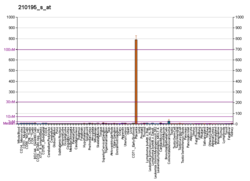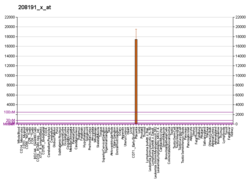CD66f
| PSG1 | |||||||||||||||||
|---|---|---|---|---|---|---|---|---|---|---|---|---|---|---|---|---|---|
| Identifiers | |||||||||||||||||
| Aliases | PSG1, B1G1, CD66f, DHFRP2, FL-NCA-1/2, PBG1, PS-beta-C/D, PS-beta-G-1, PSBG-1, PSBG1, PSG95, PSGGA, PSGIIA, SP1, pregnancy specific beta-1-glycoprotein 1 | ||||||||||||||||
| External IDs | HomoloGene: 136364 GeneCards: PSG1 | ||||||||||||||||
|
|||||||||||||||||
| RNA expression pattern | |||||||||||||||||
  
|
|||||||||||||||||
| More reference expression data | |||||||||||||||||
| Orthologs | |||||||||||||||||
| Species | Human | Mouse | |||||||||||||||
| Entrez |
|
|
|||||||||||||||
| Ensembl |
|
|
|||||||||||||||
| UniProt |
|
|
|||||||||||||||
| RefSeq (mRNA) |
|
|
|||||||||||||||
| RefSeq (protein) |
|
|
|||||||||||||||
| Location (UCSC) | Chr 19: 42.87 – 42.88 Mb | n/a | |||||||||||||||
| PubMed search | n/a | ||||||||||||||||
|
|
|||||||||||||||||
n/a
n/a
n/a
NM_001184825
NM_001184826
NM_001297773
NM_006905
NM_001330524
n/a
NP_001171754
NP_001171755
NP_001284702
NP_001317453
NP_008836
n/a
Pregnancy specific beta-1-glycoprotein 1 (PSBG-1) also known as CD66f (Cluster of Differentiation 66f), is a protein that in humans is encoded by the PSG1 gene. Pregnancy-specific glycoproteins (PSGs) are a complex consisting of carbohydrate and protein, which is present in the mammalian body specifically during pregnancy. This glycoprotein is the most abundant protein found in the maternal bloodstream during the later stages of pregnancy and it is of vital importance in fetal development. The PSG functions primarily as an immunomodulator to protect the growing fetus.
PSG is a member of the immunoglobulin (Ig) superfamily and contains four immunoglobulin domains.
...
Wikipedia
